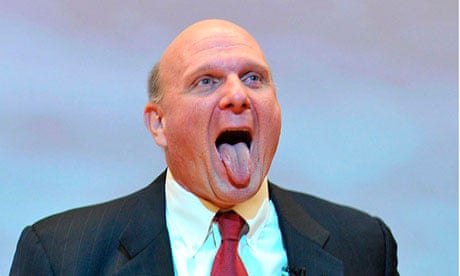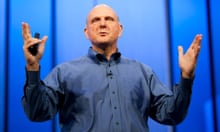Steve Ballmer started at Microsoft in 1980, arriving from Procter & Gamble to become Bill Gates' first business manager. After 20 years at the heart of Gates' team he took over as chief executive, reportedly after relations between the two had become strained.
His testosterone-fuelled presentational style was the most visible contrast to the geekish, entrepreneurial enthusiasm of Gates. Clips of Ballmer manically leaping and screaming across the stage at Microsoft sales staff events, professing his "love" for the company, have received more than 5m hits on YouTube.
Ballmer oversaw a dramatic shift away from Microsoft's PC roots, acquiring Skype and pushing into cloud computing. As new competitors emerged, he promised to "out-innovate Google" and even, on one occasion in 2004, allegedly vowed to "kill Google", hurling a chair across the room. Balmer has said descriptions of the outburst were exaggerated.
Meanwhile, efforts to keep Microsoft at the cutting edge of the digital age have not always inspired the undying love of Microsoft shareholders. Two years ago David Einhorn, the activist hedge fund boss who made a fortune short-selling Lehman Brothers, called for him to go, insisting he was "stuck in the past".
Einhorn said Mircosoft – in which his Greenlight Capital is a major investor – had missed a string of opportunities under Ballmer's "Charlie Brown management", referring to the hapless star of the Peanuts cartoon strip.
The hedge fund boss has described Ballmer's leadership as "the biggest overhang on Microsoft's stock", after the software firm chief executive had allowed Apple to steal a competitive lead in recent years, developing new markets for tablet computers and smartphone technologies.
"He has allowed competitors to beat Microsoft in huge areas, including search … Even worse, his response to these failures has been to pour tremendous resources into efforts to develop his way out of these holes."
Last week Einhorn repeated his view in a letter to Greenlight investors in which he claimed "a decade of mismanagement has put Microsoft at risk of becoming a shrinking company".
On Friday Ballmer admitted the timing of his departure was not as he had previously hoped. "We have embarked on a new strategy with a new organisation … My original thoughts … would have had my retirement happen in the middle of our company's transformation to a devices and services company. [But] we need a CEO who will be here longer term for this new direction."




